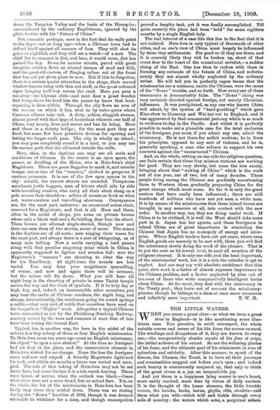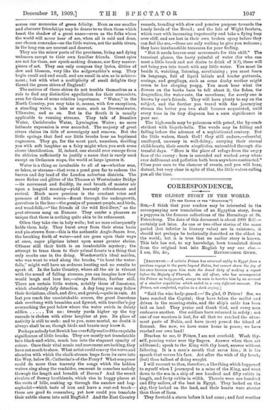THE LITTLE WATERS.
WHEN you name a great river—or what we term a great river in England—it is like mentioning some illus- trious man. You perceive, in swift retrospect, the whole notable course and career of his life, from the source onward. The windings and divagations of it, they are known to every one,—the comparatively slender repute of his forts et origo, the initial ardours of his outset. So are the widening glories of his fame, and the ultimate goal of his attainment in seas of splendour and celebrity. After this manner, to speak of the Severn, the Thames, the Trent, is to have 311 their journeys and eventualities mapped out before one's eyes ; and indeed such beauty is concurrently conjured up, that only to think of the great rivers is a joy, an unspeakable joy.
And yet there is a happiness lying nearer to one's heart, more easily reached, more dear by virtue of daily contact. It is the thought of the lesser streams, the little humble waters, the brooks, becks, burns, ghylls, rills, rivulets—call them what you will—which trill and tinkle through every mile of country : the waters which echo, a perpetual solace, across our memories of green felicity. Even as our smaller and obscurer friendships may be dearer tons than those which boast the shadow of a great name—even as the folks whom the world will never hear of are, when all is said and done, our chosen comrades—so the little waters, not the noble rivers, in the long run are nearest and dearest They are the minor poets of the provinces, living and dying unknown except to their own familiar friends. Great epics are not for them, nor epoch-making dramas, nor fiery master- pieces of art. They can only compass tiny lyrics, ditties of dew and blossom, very like the sedgewarbler's song. They begin small and end small, and are small in aim as in achieve- meat; but with what a multiplicity of small delights they thread the green shires of England!
The natives of those shires do not trouble themselves as a rule to find any distinctive appellation for their streamlets, even for those of some relative importance. "Water," in the North Country, you may take it, means, with few exceptions, a standing water, a lake or mere, such as Derwentwater, Illlswater, and so on. But in the South it is usually applicable to running streams. They talk of Beaulieu Water, Carisbrooke Water, Lymington Water ; no more intimate expression is ever accorded. The majesty of great rivers claims its title of sovereignty and renown. But the little springs that feed our little brooks bear no baptismal
cognomen. They go, for the most part, nameless, deriding you with soft laughter as a fairy might when you seek some closer identification. If, indeed, one should ever emerge from its oblivion sufficiently to justify a name that is rarely used except on Ordnance maps, the world at large ignores it.
Water is a. thing so invaluable to all of us—whether seas, or lakes, or streams—that even a pond goes far to redeem the barren and dry land of the London suburban districts. The mere flicker and glitter of the Thames at Westminster Bridge —its movement and fluidity, its cool breath of moister air upon a languid noonday—yield heavenly refreshment and revivaL Much more precious is the constant voice and presence of little waters—fluent through the undergrowth, garrulous in the lane—the gossips of peasant-people, and birds, and wood-folk,—" the friends of the wild Red-Deer," as the peat-streams sang on Exmoor. They confer a pleasure so unique that there is nothing quite akin to its refinement.
Often they take rise in holy wells ; but no man subsequently holds them holy. They burst away from their stone basin
and pin-strewn floor—this is the authentio Anglo-Saxon broc,
the breaking forth of water—and are gone upon their ways at once, eager pilgrims intent upon some greater shrine.
Oftener still their birth is an incalculable mystery; the attempt to trace them to their primal founts is a thing that only mocks one in the doing. Wordsworth's ideal maiden, who was wont to wind along the brooks, "to hunt the water- falls," might well have an arduous hunting and no results to speak of. In the Lake Country, where all the air is vibrant with the sound of falling streams, you can imagine how they would laugh and lure her,—always further, further still. There are certain little waters, notably those of limestone, -which absolutely defy detection. A day long you may follow their deviations, climb, and dive, and grovel,—quite in vain. At last you reach the unmistakable source, the great limestone- slab overhung with brambles and fig-wort, with traveller's-joy overarching the pool below where the water swirls in dainty eddies Yet no : twenty yards higher up the toy cascade is shaken with silver laughter at you. Its place of nativity is still to seek : and to you, mere mortal, no doubt it always shall be so, though birds and beasts may know it.
Perhaps nobody but Bewiek has ever fullyrealised the exquisite significance of little brooks. They are mostly not translatable into black-and-white, much less into the stagnant opacity of colour. Once their vital music and movement are lacking, they have not much to show. What artist could convey the verve and abandon with, which the chalk-stream leaps from its cave into the Wey, below St-Catherine's-of-the-Ferzy P What composer could do more than travesty the songs which the hidden waters sing along the roadsides, resonant in ceaseless melody through the length and breadth of Devon P And the secret rivulets of Surrey heathlande, which rise- in boggy places at the roots of hills, soaking up through the sundew and bog- asphodel—which taste of iron and leave a rust-red track- • these are good to remember.; yet how could you translate their subtle charm into cold English P._ And the East Country runnels, trending with slow and pensive purpose towards the lonely levels of the Broad ; and the Isle of Wight freshets, which race with increasing impetuosity and take a flying leap over cliff, and are lost in their own broken spray before they can feel the sea,—these are only waiting to give you welcome ; they have inexhaustible treasures for your finding.
"But it needs heaven-sent movements for this skill." The transient glance, the hasty palmful of water (for who can meet a little brook and not desire to drink of it ?), these will not bring you into touch with any little water. You must lie beside it, watching, listening, scrutinising; you mast learn its language, full of liquid labials and tender gutturals, eooings, and gurglings, such as some dusky mother might croon to her sleeping young. You must hear what the flowers on the banks have to tell about it, the fishes, the dragonflies, the water-rats, the moorhens; for surely one is known by one's friends. They will have plenty to say on the subject, and the further you travel with the journeying stream the better you two shall become acquainted, until every tone in its tiny diapason has a sure significance in your ear.
The high-roads may be poisonous with petrol, the by-roade strident with bicycle-bells. The woods may be falling and failing before the advance of a sophisticated century. But the little waters, thank God ! they still endure,—cheerfuls unalloyed, unweary in well-doing ; carrying their eternal child-hearts, their sancta sintplicitcle, untroubled through dis- tressful days. "Here is the place of refuge from the angry face of the enemy : here is amended and washed away what- ever defilement and pollution hath been anywhere contracted." Close your ears to the clamour of events, and you will hear, distant, but very clear in spite of that, the little waters calling you all the time.



















































 Previous page
Previous page